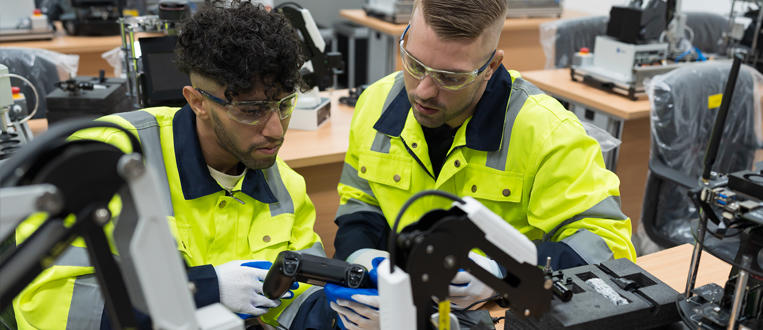Manufacturing Innovation Blog
Powered by the Manufacturing Extension Partnership
Tap into a new talent pool to fill your workforce gaps: Second chance citizens

As manufacturers look to expand their talent pool, one often overlooked demographic is second chance citizens – people who were previously incarcerated and are ready to return to the workforce These individuals often bring valuable skills and a willingness to learn and grow with your company.
As an example, Mercury Plastics hired more than 200 second chance citizens with an 80% successful retention rate, compared to a 60% retention rate when hiring from the general population, according to a recent IndustryWeek article. Other manufacturers are also seeing success with this sometimes-overlooked talent pool. More than 80% of managers report that the value these workers bring to companies is just as high as the value that their employees without criminal records provide, according to the Manufacturing Institute.
Promising outcomes like these are why the Purdue Manufacturing Extension Partnership’s (Indiana MEP Center) training program, Manufacturing Skills for Success (MS4S), has resonated with second chance citizens.
MS4S has been successfully replicated inside correctional facilities across Indiana and Tennessee, equipping people with the hands-on skills they need to fill essential manufacturing positions when they are released from prison.
There is now a tremendous opportunity to expand MS4S across the MEP National Network™ to other MEP Centers and to their manufacturing communities. This licensed program from Purdue University provides the ideal format for other MEP Centers and their community partners to launch similiar programs, with available resources such as:
- Copyrighted plug-and-play materials for the licensed training curriculum
- Train-the-trainer programs for upskilling instructors
Manufacturing skills for success: How it works
Each MS4S cohort works through a 10-day boot camp of manufacturing basics, Participants finish the program with the training they need to enter the manufacturing workforce, including:
- 80 hours of hands-on training
- Purdue University certificate of learning
- Occupational Safety and Health Administration 10-hour General Industry Card
- Essential skills for working in a manufacturing environment, such as:
- Problem-solving and root-cause analysis
- Blueprint reading, measurement, quality tools and techniques
- 5S system, lean manufacturing principles
Trainees leave the program with the basic technical skills they need to succeed in the workplace, including how to communicate effectively, work in teams, and think critically.
MS4S is a win-win for second chance citizens and employers
Since MS4S was piloted in 2016 and launched in 2017, the program has grown each year, with more than 1,600 individuals trained to date.
Community partnerships have been key to the program’s success. For example, in Indiana, the Lawrence County Economic Growth Council and the Sheriff’s Department of Lawrence County teamed with Purdue MEP to offer MS4S to qualifying inmates at the Lawrence County Jail. The program has served as a career launching pad for individuals new to manufacturing or to the workforce, people seeking work, and as a way to update workplace skills.
Today, MS4S continues to be a win-win. The program provides a step up for people who have served their time in prison. It provides them with essential technical and teamwork skills to transition to a civilian career. For manufacturers, it provides the market sector with a trained workforce ready for employment.
Other successful MS4S programs have been conducted by:
- Monroe County, Indiana Correctional Facility
- Clark County, Indiana Correction Facility
- Project Azul for the Chronic Unemployed, in Indianapolis, Indiana
And more than 190 individuals have been trained in nine correctional facilities across Tennessee after the Tennessee MEP licensed MS4S from Purdue University.
Challenges to ensuring program success
At Purdue MEP, we have learned some valuable lessons for other MEP Centers that want to implement MS4S in their communities. Active participation every day of the 10-day training program is essential. It is easier to keep all participants engaged eight hours a day when the individuals are still inside a correctional facility or in transitional housing.
Once they have been released and reentered society, it is much more challenging for them to stick to the 10-day program for eight hours a day. One reason is they are often required to get a job after they are released as a condition of their parole. Most often this is a part-time job that conflicts with their class meeting time.
Purdue MEP is currently looking into ways to address this, such as spreading out the cohorts into more days with fewer hours each day, so people can attend the sessions around their part-time work schedules.
Community connections and education can overcome barriers
Another lesson we have learned from multiple MS4S cohorts is that it can be challenging to quickly connect program graduates with area employers in the manufacturing sector. This is why Purdue MEP is in the process of launching a new job fair that will invite area employers to meet MS4S participants near the end of their training or immediately after the training is completed.
Community partners, such as parole offices and nonprofits that provide wrap-around services, are key to MS4S graduates successfully onboarding as new employees. This includes working with employers to understand the unique issues that may arise for the second chance individual. For example, work schedules may need to be flexible to ensure the new employees are able to check in with their parole officers at required times.
Other community partners, such as housing and transportation departments, along with family services, can help with wrap-around services for successfully onboarding and retaining second chance citizens in the workplace, including:
- Affordable housing
- Reliable childcare
- Reliable and affordable transportation
At Purdue MEP, we help educate manufacturers on how to reassess some of their policies regarding hiring and onboarding people who have finished their incarceration.
Your local MEP Center can provide educational resources to help with:
- Job descriptions: It may be time to rethink language such as “no criminal backgrounds” which could keep second chance citizens from applying.
- Interviewing: The interview is where you can determine how ready the job candidate is for employment. Some second chance citizens may require additional training to be ready for the workforce. Others may have the technical skills and the soft skills to begin work right away.
- Onboarding: Communicating with new employees and their parole officers can help address any barriers that may impact their work attendance and retention.
Connect with your local MEP Center
Your local MEP Center can connect you with resources and community partners to help you overcome any barriers to hiring second chance citizens and help you increase retention rates.
If you are interested in learning how a program like MS4S could be replicated in your city or state, contact your local MEP Center!




